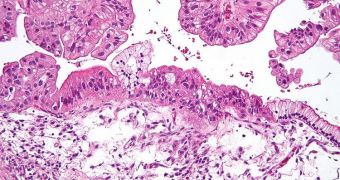Ovarian cancer is a disease that can have devastating consequences on a woman's body. Even when the tumors do not spread throughout the body, chemotherapy and radiotherapy can do little to kill morphed cells, and so doctors oftentimes have to remove the ovaries completely. Since treatments aimed at the disorders fail many times, researchers have now shifted their attention towards discovering methods of preventing the disease from setting in in the first place. As part of these efforts, the investigators found out that drinking tea can help reduce the risk by a considerable margin, PhysOrg reports.
The scientists note that black, green and herbal tea is extremely efficient at diminishing ovarian cancer risk, by up to 30 percent. The secret is to consume more than four cups each day, experts at the Queensland Institute of Medical Research (QIMR) say. The team was lead by Gynecological Cancer Group expert Dr Christina Nagle. She reveals that previous investigations on unsuspecting lab mice have hinted at the idea that tea can be a good preventer of cancer. However, tests run on humans failed to reach the same conclusion. “However, our findings support the idea that the antioxidants in tea may be beneficial against cancer in humans,” Nagle says.
“Green tea is thought to be the healthiest kind of tea. Although the results of our study did not show a stronger effect for green tea, combining all of the evidence worldwide suggests that drinking one or more cups green tea per day may reduce your risk of developing ovarian cancer by 40%. However this needs to be confirmed through further research. The earlier the diagnosis, the better the chances of survival. So the more women who know about ovarian cancer and its symptoms, the better,” the expert further says. She adds that the investigation was conducted on about 2,700 Australian women, of which half had the disease, and the other half were healthy.
Some of the factors the scientists controlled for in their investigation included diet preferences, lifestyle choices and ovarian cancer risk in the family. The work was prompted by the fact that 75 percent of all cases are discovered when the condition is already in an advanced stage, meaning that survival chances are fairly slim. Experts around the world want to develop diagnosis methods that can identify the cancer before it spread to other organs. In Australia alone, 800 women die of ovarian cancer every year, and official statistics show that this makes it the sixth most deadly illness on the continent.

 14 DAY TRIAL //
14 DAY TRIAL //